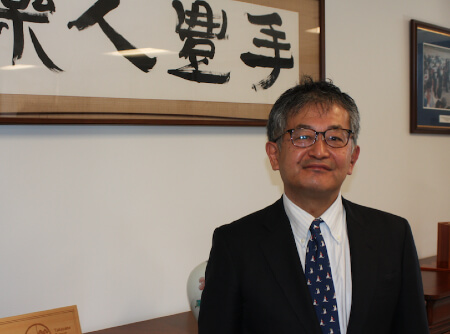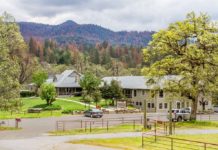CHANUKAH 5783 SECTION A PAGE 20
Mikami Yoichi, Denver’s Consul General to Japan, takes a quick gaze from his 30th floor, glass-walled office; a stunning vantage point of the cityscape. A visitor admires the panoramic view and Mikami quickly grins, prompting a stage-like whisper.
Consul Mikami in his downtown Denver office. (Steve Mark)
“Don’t tell anyone back home about the view,” he laughs, setting a congenial tone.
“Call me by my last name, Mikami, because if you will call me by my first name, Yoichi, I feel like I am being scolded by my father.”
More laughter, especially from the host.
But make no mistake; Mikami is all business about his homeland’s growth in the Rocky Mountain region.
He is also keenly attentive to the safety of the Asian community in his diplomatic home. One day earlier, Mikami had a lengthy meeting with the Anti-Defamation League.
“They were talking about the rise of anti-Semitic violence and those sort of actions,” said Mikami. “They want to be with the Asian community to fight against this trend.
“Various groups have told them (the ADL) that in some areas, violence against Asian people, especially after COVID started, could be spreading.
“This discrimination or sort of violence cannot be accepted. We agreed with that, and they kindly provided us with lots of information.”
Mikami is also in dialogue with the American Jewish Committee and the Mizel Institute’s Counterterrorism Education Learning Lab.
There are 4,877 Japanese citizens in Colorado. Mikami pivots seamlessly from his commitment to those citizens, to the business opportunities in Colorado that could be advantageous to Japan.
“There are lots of opportunities in agriculture and high tech in Colorado,” says Mikami.
“One of the missions here is to expand trade between Japan and Colorado, and Japan’s government has been trying to invite some investment from abroad to Japan.
“We are trying to revive our economy and Colorado has some very good industry to share. In 2021, Japan was the sixth-largest destination for Colorado, in terms of trade.”
Mikami then chuckles. “You have some very good beef here, too.”
Mikami’s diplomatic journey has taken him all around the globe. His first post outside Japan was as an attaché at Japan’s embassy in Tel Aviv in 1986. Four years later Mikami became vice-consul in the Consulate General’s office in New York. He returned to the embassy in Tel Aviv in 1999, primarily as an investment officer. In 2017 Mikami was chief negotiator in the Bilateral Investment Treaty between Japan and Israel.
“As you know, Israel is very tough in negotiations, but very smart,” Mikami said. “We had the same objective to get it done.’
To prepare for his assignment in Israel, Mikami was sent to Jerusalem and The Hebrew University to learn Hebrew. Despite a self-proclamation of rustiness, Mikami is quite serviceable in the language.
“Hebrew was fun to learn,” said Mikami. “I know everybody studies English from early ages, and it is a very challenging language to learn. You English speakers think English is easy, but it’s really difficult.
“At least, I think so, for Japanese people.”
A slight language barrier created a delicate issue on December 27, 1999. That’s when Mikami’s son Daisuke was born in Jerusalem. It was assumed by those presiding over the birth that the family was Jewish and would quickly need a mohel. Mikami and his wife didn’t, which provided a brief moment of anxiety, tinged with humor.
“After he was born, people came into our room and repeatedly said; ‘You need a mohel for a bris,’ remembered Mikami.
“I said, oh, no, no, no, this is different for us. And they said, ‘What are you talking about? You need the procedure on that.”
Finally, the hospital staff got the message.
“OK, no bris,” everyone ratified. Language barriers sometimes provide the best levity.
Mikami’s experience in Israel has been part of a lifelong Middle East journey for the native of Kyoto. Even after leaving his last posting in Israel in 2003, he remains been fascinated by the culture.
“After one of the sessions of the treaty negotiation, I was told about the book Sapiens, by Yuval Noah Harari, which was first written in Hebrew and then translated to English and Japanese.”
Sapiens is “a brief history of humankind.”
“The book was not that well known in Japan,” Mikami said, “so I bought it at the airport in Tel Aviv in Hebrew.”
Mikami seemed quite proud to have completed the text in Hebrew.
Along with his stints in Tel Aviv and New York, Mikami has worked in Washington, DC, and Ankara.
Mikami hopes this current assignment, which began in October, 2021, will be a lengthy one. He loves Colorado.
There is one particular personal item in play with his residence here.
“The Rocky Mountains appear in our textbooks for the kids in schools,” Mikami said. “I still remember reading these books with beautiful Rocky Mountains. They showed pictures of people fly fishing, and I studied about that.
“I learned to fly fish about 30 years ago in New York, and I heard lots of good things about Colorado, including fly fishing.
“So I decided to come.”
When our visit is over, there is still some residual reference to the mohel dilemma in 1999, and there is a bit of cackling all around.
Then, goodbye.
“Le-hitra’ot.”
In Hebrew, that’s “Hope to see you again.”
Copyright © 2022 by the Intermountain Jewish News
Related
Credit: Source link































